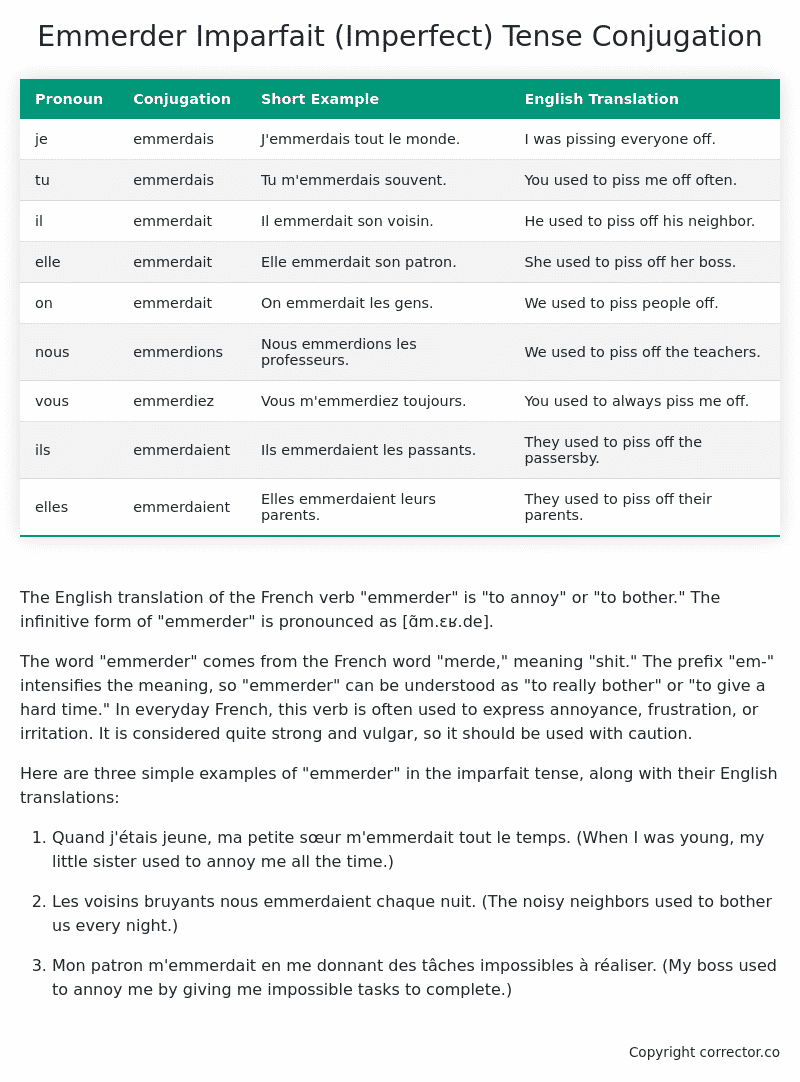Imparfait (Imperfect) Tense Conjugation of the French Verb emmerder
Introduction to the verb emmerder
The English translation of the French verb “emmerder” is “to annoy” or “to bother.” The infinitive form of “emmerder” is pronounced as [ɑ̃m.ɛʁ.de].
The word “emmerder” comes from the French word “merde,” meaning “shit.” The prefix “em-” intensifies the meaning, so “emmerder” can be understood as “to really bother” or “to give a hard time.” In everyday French, this verb is often used to express annoyance, frustration, or irritation. It is considered quite strong and vulgar, so it should be used with caution.
Here are three simple examples of “emmerder” in the imparfait tense, along with their English translations:
-
Quand j’étais jeune, ma petite sœur m’emmerdait tout le temps.
(When I was young, my little sister used to annoy me all the time.) -
Les voisins bruyants nous emmerdaient chaque nuit.
(The noisy neighbors used to bother us every night.) -
Mon patron m’emmerdait en me donnant des tâches impossibles à réaliser.
(My boss used to annoy me by giving me impossible tasks to complete.)
Table of the Imparfait (Imperfect) Tense Conjugation of emmerder
| Pronoun | Conjugation | Short Example | English Translation |
|---|---|---|---|
| je | emmerdais | J’emmerdais tout le monde. | I was pissing everyone off. |
| tu | emmerdais | Tu m’emmerdais souvent. | You used to piss me off often. |
| il | emmerdait | Il emmerdait son voisin. | He used to piss off his neighbor. |
| elle | emmerdait | Elle emmerdait son patron. | She used to piss off her boss. |
| on | emmerdait | On emmerdait les gens. | We used to piss people off. |
| nous | emmerdions | Nous emmerdions les professeurs. | We used to piss off the teachers. |
| vous | emmerdiez | Vous m’emmerdiez toujours. | You used to always piss me off. |
| ils | emmerdaient | Ils emmerdaient les passants. | They used to piss off the passersby. |
| elles | emmerdaient | Elles emmerdaient leurs parents. | They used to piss off their parents. |
Other Conjugations for Emmerder.
Le Present (Present Tense) Conjugation of the French Verb emmerder
Imparfait (Imperfect) Tense Conjugation of the French Verb emmerder (You’re reading it right now!)
Passé Simple (Simple Past) Tense Conjugation of the French Verb emmerder
Passé Composé (Present Perfect) Tense Conjugation of the French Verb emmerder
Futur Simple (Simple Future) Tense Conjugation of the French Verb emmerder
Futur Proche (Near Future) Tense Conjugation of the French Verb emmerder
Plus-que-parfait (Pluperfect) Tense Conjugation of the French Verb emmerder
Passé Antérieur (Past Anterior) Tense Conjugation of the French Verb emmerder
Futur Antérieur (Future Anterior) Tense Conjugation of the French Verb emmerder
Subjonctif Présent (Subjunctive Present) Tense Conjugation of the French Verb emmerder
Subjonctif Passé (Subjunctive Past) Tense Conjugation of the French Verb emmerder
Subjonctif Imparfait (Subjunctive Imperfect) Tense Conjugation of the French Verb emmerder
Subjonctif Plus-que-parfait (Subjunctive Pluperfect) Tense Conjugation of the French Verb emmerder
Conditionnel Présent (Conditional Present) Tense Conjugation of the French Verb emmerder
Conditionnel Passé (Conditional Past) Tense Conjugation of the French Verb emmerder
Conditionnel Passé II (Conditional Past II) Tense Conjugation of the French Verb emmerder
L’impératif Présent (Imperative Present) Tense Conjugation of the French Verb emmerder
L’impératif Passé (Imperative Past) Tense Conjugation of the French Verb emmerder
L’infinitif Présent (Infinitive Present) Tense Conjugation of the French Verb emmerder
L’infinitif Passé (Infinitive Past) Tense Conjugation of the French Verb emmerder
Le Participe Présent (Present Participle) Tense Conjugation of the French Verb emmerder
Le Participe Passé (Past Participle) Tense Conjugation of the French Verb emmerder
Struggling with French verbs or the language in general? Why not use our free French Grammar Checker – no registration required!
Get a FREE Download Study Sheet of this Conjugation 🔥
Simply right click the image below, click “save image” and get your free reference for the emmerder imparfait tense conjugation!

Emmerder – About the French Imparfait Tense
NOTE: To take a deep dive into all the French tenses then see our article on Mastering French Tense Conjugation.
Formation of the Imparfait Tense
For regular -er verbs:
For regular -ir verbs
For regular -re verbs
Common Everyday Usage Patterns
Description of Past Habits
Background Information
Mental and Emotional States
It’s employed to express emotions, thoughts, or physical sensations in the past. For example: “J’étais content quand il est arrivé.” (I was happy when he arrived.)
Ongoing Actions
Points to Note About the Imparfait Tense
Passé Composé vs. Imparfait
Conditional
Si Clauses
Narration
I hope you enjoyed this article on the verb emmerder. Still in a learning mood? Check out another TOTALLY random French verb imparfait conjugation!


